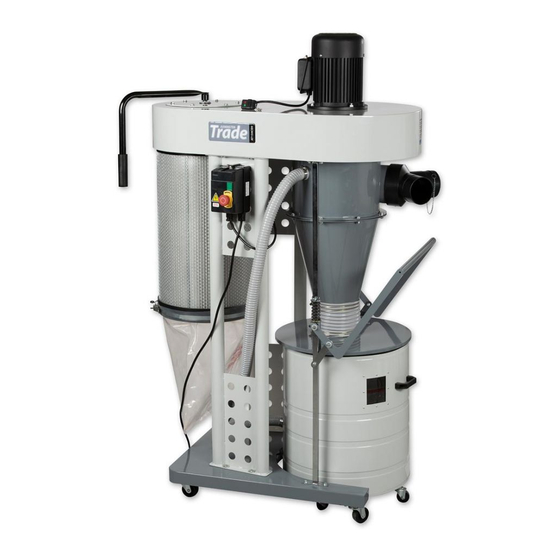- ページ 9
スクラバー Axminster Trade 105784のPDF オリジナル取扱説明書をオンラインで閲覧またはダウンロードできます。Axminster Trade 105784 16 ページ。 Cyclone extractors
Axminster Trade 105784 にも: オリジナル取扱説明書 (16 ページ)

MAINTENANCE
WARNING!! BEFORE CARRYING OUT ANY
MAINTENANCE DISCONNECT THE CYCLONE
EXTRACTOR FROM THE MAINS SUPPLY
WARNING!! KEEP CHILDREN AWAY FROM WORK
AREA
WARNING!! always wear a dust mask
WARNING!! Always wear eye protection
After a period of time dust, sawdust and shavings can
build-up causing blockages and reduced suction
performance. Follow the maintenance instructions below
to keep your extractor working a peak performance.
Basic Maintenance
Daily
• Operate the filter cleaning handle.
• Empty the collection bag before it overflows, wear a
dust mask whilst removing and emptying the bag.
Weekly
• Check the inlet and outlet ducts and remove any
accumulated sawdust.
• Check the inlet hoses for splits and cracks, repair as
necessary.
• Check the dust collection bag for wear and tear,
especially around the neck at the jubilee clip. If wear
or fraying is occurring, replace the bag.
• Check the motor for dust, sawdust, shavings etc,
build up. If this has occurred, clean with an 'M' class
vacuum cleaner.
(MODEL AP357CEH ONLY)
• Start up the extractor, wait a few seconds and
switch off, approximately 60 seconds later the
shaker motor will start up. There will be a distinct
clicking noise as the shaker motor paddles goes
round, switching off automatically. If no sound
is heard remove the filter bag and look up inside
the filter for any signs that the paddles are being
obstructed. If there is no obstruction contact
Axminster Tool Centre's on 03332 406406 for
assistance.
Why should I bother with LEV?
The law says you must control the risks from these substances
(the Control of Substances Hazardous to Health (COSHH)
Regulations). Installing LEV may help you to do this.
For more information about other ways of eliminating or
reducing airborne contamination at work look at HSE's COSHH
website, hse.gov.uk/coshh.
Health and Safety Executive
A guide to local exhaust ventilation (LEV)
Ref Code: HSG258
The book above provides guidance on the supply of local
exhaust ventilation (LEV) equipment. It describes the principles
and good practice of deciding on, designing, commissioning
and testing cost-effective LEV.
The guidance is written for the suppliers of LEV goods and
services, but will also be helpful for employers and managers in
medium-sized businesses, and trade union and employee safety
representatives. All of these groups need to work together to
provide, maintain and use effective LEV and to reduce exposure
from inhalation of hazardous substances.
The book contains information about the roles and legal
responsibilities of suppliers and of their clients as employers;
competence; principles of good design practice for effective
LEV hoods and their classification; ducts, air movers, air cleaners;
and system documentation with checking and maintenance
schedules, and the marking of defective equipment.
It also includes guidance on the specification of LEV; the
supplier's quotation; commissioning; zone marking; the user
manual and logbook; testing and hood labels.
9
LEV TESTING
